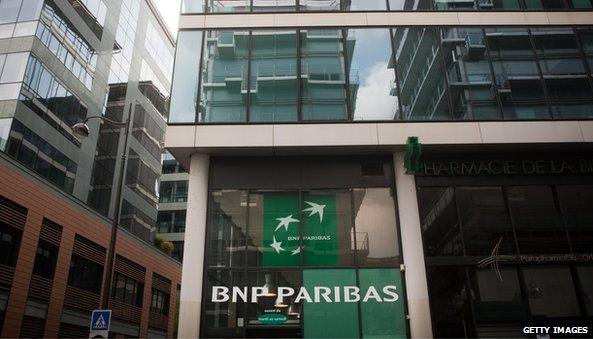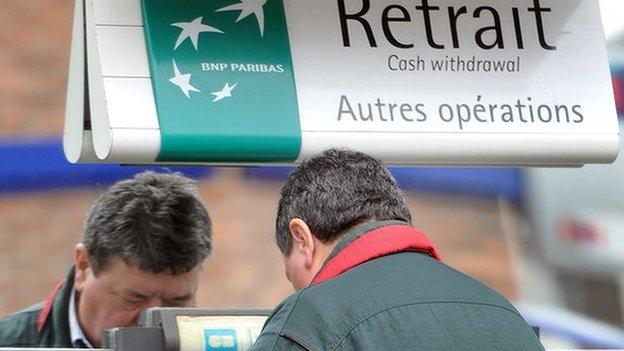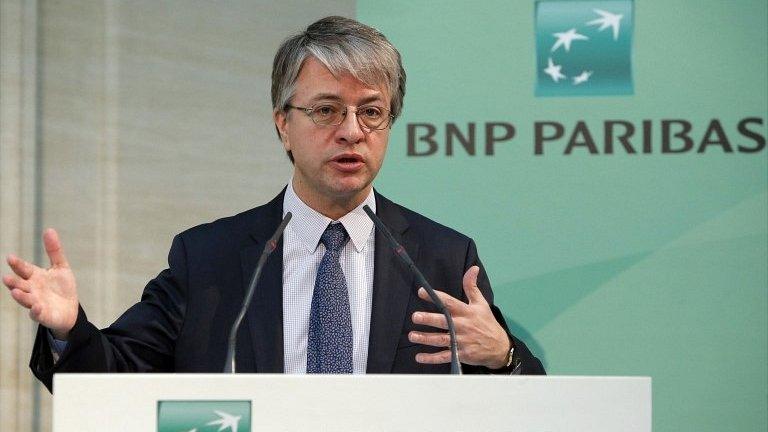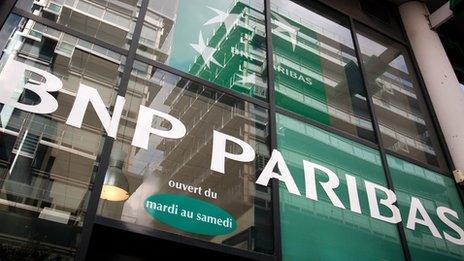BNP Paribas to pay $9bn to settle sanctions violations
- Published

In April, the bank said it had set aside $1.1bn to cover the cost of US penalties
France's largest bank, BNP Paribas, has agreed to a record $9bn (£5.1bn) settlement with US prosecutors over allegations of sanctions violations.
As part of the deal, the bank will plead guilty, external to two criminal charges of breaking US sanctions against trade with Sudan, Iran and Cuba.
It will also be prevented from clearing certain transactions in US dollars for one year from the start of 2015.
The settlement is the largest for such a case in US history.
"Between 2004 and 2012, BNP engaged in a complex and pervasive scheme to illegally move billions through the US financial system," said US Attorney General Eric Holder in a press conference.
In doing so, the bank "deliberately and repeatedly violated longstanding US sanctions", he said.
Mr Holder added that he hoped the settlement would serve as a warning to other firms that did business with the US that "illegal conduct will simply not be tolerated".
As part of its agreement with US authorities, BNP agreed to fire and not re-hire 13 individuals who were associated with the sanctions violations.
'Unfair decision'
BNP said as a result of the fine it would take an "exceptional charge" of 5.8bn euros (£4.6bn) in the second quarter of this year.
It said this was on top of the $1.1bn it had already set aside to cover the cost of the US penalties.
However it said it expected "no impact on its operational or business capabilities", and said it would post "solid results" for the second quarter.
BNP chief executive Jean-Laurent Bonnafe said resolving the issue was "an important step forward" for the bank.
"We deeply regret the past misconduct that led to this settlement," he added.
In a conference call on Tuesday morning, Mr Bonnafe explained that during the year in which the bank was banned from dollar clearing - converting payments from foreign currencies into US dollars - it would engage a third party to carry out the transactions.
He said this would represent "quite some work" to set this up and that they had been given six months to do so.
He added that as part of the settlement BNP Paribas would be able to keep its licence to operate in the US.
The Swiss financial regulator, FINMA, also announced that it had closed its investigation into BNP Paribas operations in the country, following the US authorities' decision.
In a statement, external, FINMA said BNP Paribas had "persistently and seriously violated its duty to identify, limit and monitor the inherent risks" relating to foreign transactions.
Shares in BNP Paribas rose more than 3% in morning trading, following assurances that the bank could weather the $9bn fine.
'Not reasonable'
France has been pressing the US over the size of the fine, which almost equals BNP's entire 2013 pre-tax income of about 8.2bn euros (£6.7bn, $11.2bn).
French Foreign Minister Laurent Fabius has previously said a fine of the size suggested would be "an extremely serious problem", an "unfair and unilateral decision" and "not reasonable".
US regulators have recently stepped up their actions against banks that violate laws against money laundering and tax evasion, amongst other violations.
Earlier in May, Swiss bank Credit Suisse agreed to a $2.6bn penalty and admitted criminal wrongdoing in helping "tax cheats" avoid paying US taxes.
And in 2012, UK-based bank Standard Chartered paid a total of $674m (£419m) to US regulators and authorities for illegally hiding transactions with Iran and other countries under US sanctions.
To date, the largest fine levied against a bank by US regulators for sanctions violations was the $1.9bn HSBC paid in 2012.
- Published30 June 2014

- Published30 June 2014
- Published29 June 2014

- Published13 June 2014
